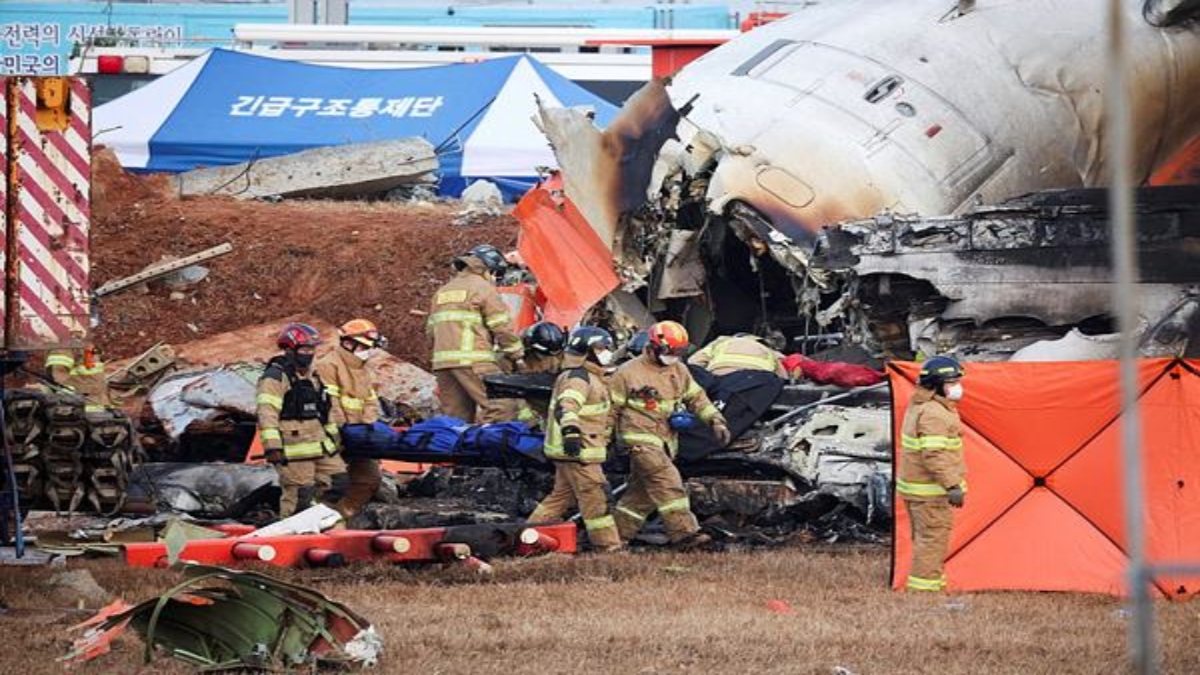South Korea witnessed its deadliest air accident in history on Sunday (December 29), as Jeju Air flight 7C2216 crashed during its landing attempt at Muan International Airport. The flight, originating from Bangkok, Thailand, had 175 passengers and six crew members on board. Tragically, 174 people lost their lives in the disaster, with only two crew members rescued, both of whom sustained serious injuries.
The Boeing 737-800 aircraft was attempting to land shortly after 9 a.m. when it belly-landed on runway 08/26. Witnesses reported that the aircraft appeared to be skidding down the runway without its landing gear, eventually veering off course and crashing into a wall. The impact caused a massive fireball, leaving the wreckage barely recognisable.
Local fire services responded quickly, rescuing two crew members from the tail section, which was the only part of the plane that maintained any shape after the crash. However, authorities fear that the rest of those on board are presumed dead.
The scene at the airport was chaotic, with family members of the passengers arriving in distress. As authorities worked to recover bodies and provide aid to the survivors, the crash site reeked of aviation fuel and blood. Mortuary vehicles were lined up to transport the deceased, and a temporary morgue was set up to handle the large number of bodies.
Investigations into the cause of the crash are underway. Preliminary reports suggest that a bird strike might have led to a malfunction in the aircraft’s landing gear. The control tower had issued a bird strike warning shortly before the plane declared a mayday and attempted to land.
As news of the crash spread, many relatives of the passengers gathered at the airport. The emotional toll was evident as family members anxiously awaited news of their loved ones.
Jeju Air’s Apology
Jeju Air CEO Kim E-bae issued a public apology, deeply bowing in front of cameras during a televised briefing. He confirmed that the aircraft had no prior record of accidents, and there were no immediate signs of malfunction before the crash. The airline promised to cooperate fully with investigators and prioritize supporting the victims’ families.
This crash marks the first fatal incident for Jeju Air, a low-cost airline that has been operating since 2005. The airline had recently started regular flights from Muan to Bangkok and other Asian cities just weeks before the disaster occurred.
Muan International Airport and the Growing Crisis
Muan International, a smaller regional airport, had been experiencing a significant increase in passenger numbers, especially after the launch of international flights from Muan in December 2024. Despite being one of the smallest airports in South Korea, it had seen a nearly 20-fold increase in international passenger traffic from 2022 to 2024.
The crash has prompted the cancellation of all flights at Muan International Airport, as authorities focus on recovery efforts and investigating the incident.
The crash has not only affected South Korea but also Thailand, as two Thai nationals were among the passengers on the flight. Thai Prime Minister Paetongtarn Shinawatra expressed her condolences, instructing her foreign ministry to provide assistance to the victims’ families.
Boeing, the manufacturer of the aircraft, expressed its deep condolences in a statement, stating that they were in contact with Jeju Air and ready to offer support during the investigation.
The tragedy comes at a time of political turmoil in South Korea, as the country is under the leadership of interim President Choi Sang-mok. The acting president visited the crash site, assuring the public that the government would mobilize all available resources to handle the aftermath of the disaster.
This devastating air accident marks the deadliest in South Korea’s history and serves as a stark reminder of the risks involved in air travel. As investigators work to determine the exact cause of the crash, the families of the victims are left to mourn their loved ones, while the country grapples with the shock of the tragedy.
(With agency inputs)






